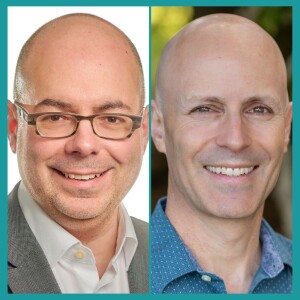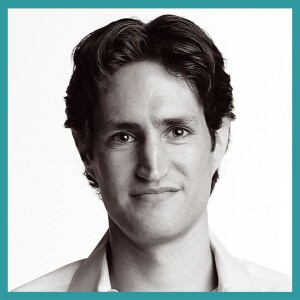
Stories, science and secrets from the world’s brightest thought-leaders. Behavioral Grooves is the podcast that satisfies your curiosity of why we do what we do. Explanations of human behavior that will improve your relationships, your wellbeing, and your organization by helping you find your groove.
Episodes

Sunday Aug 20, 2023
Imperfectly Perfect: The Science of Human Decision Making | Lionel Page
Sunday Aug 20, 2023
Sunday Aug 20, 2023
Humans have limited information processing abilities and cannot possibly evaluate all possible options when making a decision. However, describing people merely as irrational paints an inaccurate picture. There can be benefits to the biases we hold.
Author of Optimally Irrational: The Good Reasons We Behave the Way We Do Lionel Page PhD, joins Kurt Nelson and Tim Houlihan on Behavioral Grooves Podcast to talk about his book. Lionel is a French-born economist who is currently working as the Director of the Behavioural and Economic Science Cluster at the University of Queensland in Australia.
Among the topics Lionel discusses is the hedonic treadmill and how happiness is always just ahead of us. Our subjective satisfaction system is designed to keep us motivated by focusing on future goals. However, once we achieve those goals, we move on to the next.
Anticipated utility and loss aversion become a powerful motivational combination. Our motivations for decisions are complex. But intentionality can help make up for some of the inconsistencies in our decision making.
Topics
(1:51) Speed round questions.
(3:13) Is overconfidence beneficial or not beneficial?
(6:06) What is rational and irrational behavior?
(11:34) Why it is so important to define a field of work.
(14:09) Why is it so difficult for us to ask for what we want?
(17:31) Completeness helps us to find missing points.
(22:38) Happiness is actually connected to loss aversion.
(32:37) The benefits of anticipated utility.
© 2023 Behavioral Grooves
Links
Lionel Page PhD: https://economics.uq.edu.au/profile/9755/lionel-page
Lionel’s book, “Optimally Irrational: The Good Reasons We Behave the Way We Do”: https://amzn.to/46RoYIH
Episode 333, How Game Theory Can Be Used To Explain Human Behavior | Erez Yoeli: https://behavioralgrooves.com/episode/game-theory-to-explain-behavior/
Episode 171, Self Control, Belonging, and Why Your Most Dedicated Employees Are the Ones To Watch Out For with Roy Baumeister: https://behavioralgrooves.com/episode/self-control-belonging-and-why-your-most-dedicated-employees-are-the-ones-to-watch-out-for-with-roy-baumeister/
Prospect theory: https://en.wikipedia.org/wiki/Prospect_theory
Episode 276, How To Stay Motivated So You Exceed Your Goals | Ayelet Fishbach PhD: https://behavioralgrooves.com/episode/motivation-to-exceed-your-goals/
Behavioral Grooves Patreon: https://www.patreon.com/behavioralgrooves

Sunday Aug 13, 2023
Sunday Aug 13, 2023
How can we make better choices today to benefit our future selves? Hal Hershfield outlines strategies like visualizing your future self, writing letters, making commitments, and recognizing that your preferences will change over time.
Hal is a Professor of Marketing, Behavioral Decision Making, and Psychology at UCLA’s Anderson School of Management and holds the UCLA Anderson Board of Advisors Term Chair in Management. His research, which sits at the intersection of psychology and economics, examines the ways we can improve our long-term decisions. He joins us on this episode to discuss his new book, "Your Future Self: How to Make Tomorrow Better Today".
It was so tempting to make this conversation with Hal really philosophical. Is our future self the same person as today, or more like a stranger? Do memories make us who we are? How can we bridge the existential gap between our future self and current self?
But listeners will be glad to know that Kurt and Tim also delve into the practical aspects of Hal’s research, touching on how we can help ourselves plan for the future. The biggest take away though is that Hal emphasizes the need to make sacrifices feel psychologically easier today in order to benefit our future selves.
He outlines three "time travel mistakes" we frequently make: missing our flight represents getting stuck in the present, poor trip planning represents thinking about the future but not deeply, and packing the wrong clothes represents unfairly projecting our present emotions onto our future selves.
Want your future self to still be able to listen to Behavioral Grooves Podcasts? Invest in the show’s future by making a small donation on Patreon so we can keep bringing you insightful conversations like this one. Thank you to all our listeners to help make the show!
Topics
(2:54) Welcome and speed round questions.
(7:14) Is our future self actually the same person?
(11:18) Do memories make us who we are?
(15:20) Common time travel mistakes.
(22:36) Why you should write a letter to your future self.
(27:51) What do you need to do today to make tomorrow better?
(34:49) Does looking back on your regrets help you look forward.
(38:42) Hal’s future musical tastes.
(44:10) Grooving Session with Kurt and Tim on our future selves.
© 2023 Behavioral Grooves
Links
Hal Hershfield’s book “Your Future Self: How to Make Tomorrow Better Today”: https://amzn.to/3E2acSh
Wilson, T. D., & Gilbert, D. T. (2003) “Affective Forecasting”: https://dtg.sites.fas.harvard.edu/Wilson%20&%20Gilbert%20%28Advances%29.pdf
John Locke: https://en.wikipedia.org/wiki/John_Locke
Ship of Theseus: https://en.wikipedia.org/wiki/Ship_of_Theseus
Strohminger N, Nichols S. (2014) “The essential moral self”: https://pubmed.ncbi.nlm.nih.gov/24503450/
Behavioral Grooves Patreon: https://www.patreon.com/behavioralgrooves
Musical Links
The National “Sea Of Love”: https://www.youtube.com/watch?v=yIWmRbHDhGw
Guster “Satellite”: https://www.youtube.com/watch?v=bAkvb2Rhces
Cat Stevens “Father & Son”: https://www.youtube.com/watch?v=P6zaCV4niKk
The Beatles “Help”: https://www.youtube.com/watch?v=2Q_ZzBGPdqE
Belle and Sebastian “I want the world to stop”: https://www.youtube.com/watch?v=wjW3tZhdnyw

Sunday Aug 06, 2023
Money, Success and the Cult of Never Enough | Manisha Thakor
Sunday Aug 06, 2023
Sunday Aug 06, 2023
The "cult of never enough" encourages the belief that more money, possessions and achievements will make us happy. But Manisha Thakor has learnt through personal experience that emotional wealth is more important than financial wealth. Listen to learn how to redefine your success.
Manisha Thakor is the author of the book Money Zen: Escape the Cult of Never Enough and Reclaim Your Life. In this episode of Behavioral Grooves, she discusses with Kurt and Tim how she chased the American dream of financial success for 30 years before realizing it had become a nightmare. She became a workaholic and lost sight of what truly brings happiness.
Manisha talks about how the "cult of never enough" encourages the belief that more money, possessions and achievements will make us happy. However, she realized that emotional wealth is more important than financial wealth. She discusses the importance of financial health over wealth, which includes having enough to meet your needs without stress.
How does society measure success in terms of money, power and productivity rather than by character and contribution? Manisha talks about the Buddhist concept of the "hungry ghost" which represents our insatiable desires. She argues that the answer is often "less" - shedding commitments, possessions and being still in nature.
Listen to find out how to redefine success beyond financial wealth and move towards a balance of financial health and emotional wealth.
If you’d like to support the work of Behavioral Grooves, you can become a Behavioral Grooves Patreon member.
Topics
(3:45) Welcome and speed round questions.
(5:54) What is a busy badge?
(8:57) The social comparison aspect of wealth.
(13:00) The rise of the Blackberry culture.
(20:34) What you do is who you are?
(24:13) Chasing after the American Dream.
(28:46) A classic second generation immigrant story.
(31:08) Emotional wealth and financial health.
(38:42) What is the Hungry Ghost?
(42:58) The music Manisha would take to a desert island.
(46:29) Grooving Session with Kurt and Tim on redefining success.
© 2023 Behavioral Grooves
Links
Manisha Thakor’s book, MoneyZen: The Secret to Finding Your "Enough": https://amzn.to/3JtuuXV
Episode 102, Cristina Bicchieri: Social Norms are Bundles of Expectations: https://behavioralgrooves.com/episode/cristina-bicchieri-social-norms-are-bundles-of-expectations/
Dr Malissa Clark – University of Georgia: https://psychology.uga.edu/directory/people/malissa-clark
Matthew A. Killingsworth, Daniel Kahneman and Barbara Mellers (2022) “Income and emotional well-being: A conflict resolved”: https://www.pnas.org/doi/epdf/10.1073/pnas.2208661120
Episode 215, Secrets of Subtraction: Donut Holes, Lego and Bruce Springsteen with Leidy Klotz: https://behavioralgrooves.com/episode/subtraction-with-leidy-klotz/
Schulte Brigid, “Why being too busy makes us feel so good,” Washington Post: https://www.washingtonpost.com/opinions/why-being-too-busy-makes-us-feel-so-good/2014/03/14/c098f6c8-9e81-11e3-a050-dc3322a94fa7_story.html
DeGreeff, B., Burnett, A., & Cooley, D. (2009). “Communicating authenticity or inauthenticity in a fast-paced world,” Journal of Happiness Studies: https://www.researchgate.net/publication/225649342_Communicating_and_Philosophizing_About_Authenticity_or_Inauthenticity_in_a_Fast-Paced_World
The Hungry Ghost: https://en.wikipedia.org/wiki/Hungry_ghost
MoneyZen quiz online: https://quiz.tryinteract.com/#/646d1000fec8ca0014804a9e
Behavioral Grooves Patreon: https://www.patreon.com/behavioralgrooves
Musical Links
Vivaldi “Four Seasons”: https://www.youtube.com/watch?v=GRxofEmo3HA
Lionel Hampton “Flying Home”: https://www.youtube.com/watch?v=R_rTICMVXQQ

Sunday Jul 30, 2023
Sunday Jul 30, 2023
The world of applied behavioral science has never been better. So how do you get your foot in the door to have a career in the field? You may be surprised to learn that it doesn’t have to involve getting a PhD. Merle van den Akker discusses her career journey from academia into the corporate world, and what we can learn from it.
Merle van den Akker grew up in the Netherlands and studied in the UK before moving to Australia to start her current job at the Commonwealth Bank. Though she got a lot out of her PhD studies, she realized the academic system was not a good long-term fit for her. While in her PhD, Merle started the blog "Money on the Mind" which has allowed her the opportunity to interview nearly 200 leaders in the field of behavioral science and finance.
Having seen the world of behavioral science through the academic lens and now through the corporate lens, Kurt and Tim chat with Merle about how important a PhD is in the field (hint, it’s not!) But Merle gives her advice for all rising behavioral scientists and the many ways to incorporate behavioral insights into all fields of work. For those with behavioral science skills and knowledge, application can be used across many functional areas of an organization from marketing to HR to product development.
We also delve into Merle’s current work in finance. Financial solutions have a reputation of not being very human-centric and are difficult for people to navigate. Applying behavioral science and human-centered design can help transform these systems from within and take account of the cultural factors that influence our finances.
Please consider our work at Behavioral Grooves Podcast but donating a small amount on our Patreon site. We appreciate your help.
Topics
(3:49) Welcome and speed round questions.
(5:06) Do you need a PhD to work in Behavioral Science?
(9:10) The real reason Merle pursued a PhD.
(16:07) The taboo around talking about money.
(19:24) Always leave your credit card at home.
(24:13) The journey from academia into industry work.
(28:26) Advice for people who are in PhD programs.
(31:41) Money on the Mind.
(40:54) What music does Merle listen to?
(45:17) Grooving Session with Kurt and Tim on applied behavioral science.
© 2023 Behavioral Grooves
Links
CBA Bank: https://www.commbank.com.au/
Money on the Mind: https://www.moneyonthemind.org/about
Merle Van Den Akker’s book, “The Ultimate Guide To Doing a PhD”: https://amzn.to/3NZa1f2
Annamaria Lusardi: https://www.annamarialusardi.com/
Elif Incekara-Hafalir and George Lowenstein (2009), “The Impact of Credit Cards on Spending: A Field Experiment”: https://papers.ssrn.com/sol3/papers.cfm?abstract_id=1378502
Keith Wilcox, Lauren G. Block and Eric M. Eisenstein (2011) “Leave Home Without It? The Effects of Credit Card Debt and Available Credit on Spending”: https://www0.gsb.columbia.edu/mygsb/faculty/research/pubfiles/5688/wilcox_leave_home.pdf
Matthew D. Hilchey, Matthew Osborne and Dilip Soman (2021) “Does the visual salience of credit card features affect choice?”: https://www.cambridge.org/core/journals/behavioural-public-policy/article/abs/does-the-visual-salience-of-credit-card-features-affect-choice/BBD44889AEE0C6070F994FECFFCAB71F
Behavioral Grooves Patreon: https://www.patreon.com/behavioralgrooves
Musical Links
Flume “Go”: https://www.youtube.com/watch?v=Wypxk5H8kmE

Sunday Jul 23, 2023
Confidence, Certainty and Control: The Map to Success | Peter Atwater
Sunday Jul 23, 2023
Sunday Jul 23, 2023
What exactly is confidence? Peter Atwater describes it as the feelings of certainty and control that we have about our future self. He explains The Confidence Map framework and how our horizon preference and vulnerability first mindset change, based on our level of confidence.
Peter Atwater is an adjunct professor of economics at Williams and Mary University, and the President of financial insights, a consulting firm that advises global policymakers on how social mood affects decision making, the economy and the markets. He is known for coining the “K-shaped recovery” which is an economic term used by political and economic leaders. Most recently, he has examined the hidden role of confidence in the choices we make, in his new book “The Confidence Map: Charting a Path from Chaos to Clarity”.
Confidence is inherently forward-looking and involves imagining the future, which is inherently uncertain. To illustrate this, Peter introduces us to the Confidence Map, a two-by-two grid with certainty on the x-axis and control on the y-axis. The upper right quadrant represents high confidence where there is both high certainty and control. This is the "comfort zone." The lower left quadrant represents low confidence due to low certainty and control. This is the "stress center."
The other two quadrants represent situations where there is only one of the two factors needed for confidence. The "passenger seat" quadrant has uncertainty but no control, like being a passenger in a car. The "launchpad" quadrant has control but no certainty, like pulling the lever on a slot machine.
Overconfidence and under confidence can both be issues. Organizations often ignore the vulnerability people feel during a crisis, focusing only on fixing the problem, as Boeing did during the 737 Max disasters.
Listen to Tim and Kurt’s discussion with Peter and the following Grooving Session to learn how confidence can be both an input and output of decision-making and about the complex interplay between feelings, stories and actions.
We hope you enjoy listening to our discussion with Peter and if you would like to support the work of Behavioral Grooves, we would love you to join our Behavioral Grooves Patreon membership.
Topics
(2:15) Welcome and speed round questions.
(4:44) What is confidence?
(7:50) The confidence quadrant.
(12:55) Can you have too much confidence and can it be false?
(15:49) How Behavioral Economics influences our financial decision making.
(18:42) Why groups can overestimate outcomes.
(20:42) Confidence is both an input and an output.
(23:39) Horizon preference and confidence.
(27:29) What is a vulnerability first mindset?
(29:33) How Boeing focused on the wrong issue with the 737 Max disasters.
(32:19) What music would Peter take to a desert island?
(34:44) Grooving Session with Kurt and Tim on confidence.
© 2023 Behavioral Grooves
Links
Peter Atwater: https://peteratwater.com/
Peter Atwater’s book: The Confidence Map: Charting a Path from Chaos to Clarity: https://amzn.to/3NB2gM3
Daniel Kahneman and Amos Tversky (1974) Judgment Under Uncertainty: Heuristics and Biases, Science: https://www.science.org/doi/10.1126/science.185.4157.1124
Episode 31, Leaving the Matrix: Annie Duke and Insights into how you can improve your thinking! https://behavioralgrooves.com/episode/leaving-the-matrix-annie-duke-and-insights-into-how-you-can-improve-your-thinking/
Boeing 737 Max grounding: https://en.wikipedia.org/wiki/Boeing_737_MAX_groundings
Behavioral Grooves Patreon: https://www.patreon.com/behavioralgrooves
Musical Links
Steve Sondheim “Send in the Clowns”: https://www.youtube.com/watch?v=UBuDSsc9Pak
George Winston “Autumn”: https://www.youtube.com/watch?v=JKmqyQUDehs

Sunday Jul 16, 2023
Sunday Jul 16, 2023
Splashy headlines, sensational findings and world-first results grab our attention but they also leave us vulnerable to deception. Constantly being skeptical of research is an impractical stance, so how do we avoid being fooled by fraud? Daniel Simons and Christopher Chabris tell us exactly how.
If you’re one of the 13 million viewers of the Monkey Business Illusion video on YouTube, you are already familiar with the work of our guests on this episode, Daniel Simons and Christopher Chabris. As long time experts in the areas of deception and fraud, they have just published an excellent new book on the topic; Nobody's Fool: Why We Get Taken In and What We Can Do About It.
In our discussion with Dan Simons and Chris Chabris, we discuss ways to avoid being fooled and scammed based on insights from behavioral science. They talk about how habits and appealing information can make people vulnerable to deception. While being skeptical of everything all the time is impractical, people should be more skeptical when the stakes are high.
Scientific fraud is a growing concern and has hit the headlines again in the field of behavioral science. Dan and Chris outline the problems with current incentives in academic research and a new approach to conducting research that reduces the push for only publishing statistically significant results.
The snapshot takeaway from this monumental discussion though is when trying to figure out who to trust in a world swimming in disinformation, fraud and scams - look for the people who are routinely admit when they’re wrong. These are the people you can trust.
Interviewing Dan and Chris was definitely a highlight of the 350+ episodes of Behavioral Grooves Podcast. We love bringing you insights from the best minds in the field of behavioral science. If you’d like to support our ongoing work, please consider becoming a Behavioral Grooves Patreon member.
Topics
(4:04) Welcome and speed round questions.
(6:56) What readers can get out of the book, Nobody’s Fool.
(11:06) Why is a book about deception timely?
(15:31) Who can we trust?
(18:52) The replication crisis in behavioral science.
(21:36) Registered reports - a new method for publishing research.
(23:46) How to ask the right questions.
(26:38) How to detect fraud in scientific papers?
(32:59) The tension between individual choice and incentives in research.
(37:58) Normalizing a lack of confidence in your own research results.
(41:49) The bullshit receptivity scale research.
(45:09) Tips on evading selection.
(50:43) What music Dan and Chris would take to a desert island.
(55:53) Grooving Session with Kurt and Tim on being fooled.
© 2023 Behavioral Grooves
Links
The Monkey Business Illusion: https://www.youtube.com/watch?v=IGQmdoK_ZfY
Daniel Simons and Christopher Chabris’ book, Nobody's Fool: Why We Get Taken In and What We Can Do About It: https://amzn.to/3pHdkz6
Pennycook, G., Cheyne, J. A., Barr, N., Koehler, D. J., & Fugelsang, J. A. (2015). Bullshit Receptivity Scale: https://psycnet.apa.org/doiLanding?doi=10.1037/t52525-000
Behavioral Grooves Patreon: https://www.patreon.com/behavioralgrooves
Musical Links
Talking Heads “Once in a Lifetime”: https://www.youtube.com/watch?v=5IsSpAOD6K8
Dan
Ani Difranco “Both Hands”: https://www.youtube.com/watch?v=Th-GDhsveM4&ab_channel=HybridFalcon
Wax Tailor “Come With Me”: https://www.youtube.com/watch?v=XzGmze5erMo&pp=ygUKd2F4IHRheWxvcg%3D%3D
Bjork “Human Behaviour”: https://www.youtube.com/watch?v=p0mRIhK9seg&ab_channel=bj%C3%B6rk
Supertramp “Breakfast in America”: https://www.youtube.com/watch?v=3YQb-0P320s&ab_channel=KRM
Chris
U2 “Original Of The Species”: https://www.youtube.com/watch?v=Pu9rQ8lkQ5c
Bob Mould “I Don’t Know You Anymore”: https://www.youtube.com/watch?v=ZZ0ZEpJRpAE&ab_channel=MergeRecordsonYouTube

Sunday Jul 09, 2023
People Want Answers: How to Communicate in a Crisis with Christopher Reddy
Sunday Jul 09, 2023
Sunday Jul 09, 2023
Between disinformation and misinformation, it’s difficult to know what and who to trust, especially during a crisis. When disaster does strike, it is critical that scientific information is communicated clearly. Oceanographer Christopher Reddy discusses his experiences relaying vital information during the Deepwater Horizon oil spill in 2010.
Scientists are bathing in uncertainty. It is the basis of their work. As Chris says “if I’m certain about something, I’m not going to research it.” But during a disaster, people crave answers, not a comprehensive research paper published 5 years after the event! So a huge challenge for scientists is how to communicate effectively to both the media, the public and all of the stakeholders involved in disaster relief.
In this episode, we’ve reached outside of our traditional box of guests and are talking with a sharp, witty and very informative scientist, Christopher Reddy. Chris is a chemist, but for reasons he explains in the podcast, he most often refers to himself as an oceanographer. He is a leader in the study of marine pollution and the development of environmentally friendly industrial chemicals and works as a senior scientist in the Department of Marine Chemistry and Geochemistry at Woods Hole Oceanographic.
When the Deepwater Horizon oil spill disaster struck in the Gulf of Mexico in 2010, Chris was one of the sets of boots on the ground, leading the field operations. His expertise in the science of oil spills meant he was thrust into a public facing role which later got him personally entangled in the BP legal case surrounding the liability for the spill. He’s written about this experience in his new book, Science Communication in a Crisis: An Insider’s Guide.
We love bringing you interesting and funny conversations from people like Chris. If you would like to support our work, please share this episode on social media, write a review on your app or become a Behavioral Grooves Patreon member.
Topics
(3:57) Welcome and speed round questions.
(7:57) How communicating can make you a better scientist.
(13:02) Who are the most important stakeholders in the communication process?
(16:16) Mistrust in science is a big challenge.
(18:04) How to communicate uncertainty.
(22:32) Public statements have real world consequences.
(25:33) Why you shouldn’t start a conversation with your PhD qualifications!
(30:18) The hardest part of the Deepwater Horizon disaster for Chris.
(35:05) Clair Patterson’s impact on the world.
(39:11) Advice on how to become a science communicator.
(40:46) Why Chris can’t listen to music.
(46:19) Grooving Session with Kurt and Tim on communicating.
© 2023 Behavioral Grooves
Links
Chris’ book: Science Communication in a Crisis: An Insider’s Guide: https://amzn.to/3rfrKan
Deepwater Horizon oil spill in 2010: https://en.wikipedia.org/wiki/Deepwater_Horizon
Clair Patterson: https://en.wikipedia.org/wiki/Clair_Cameron_Patterson
Clair Patterson, the Hero Who Got the Lead Out of Gasoline: https://www.bbvaopenmind.com/en/science/environment/clair-patterson-got-lead-out-of-gasoline/
Freddie Mercury: https://en.wikipedia.org/wiki/Freddie_Mercury
Larry Bird: https://en.wikipedia.org/wiki/Larry_Bird
Behavioral Grooves Patreon: https://www.patreon.com/behavioralgrooves
Musical Links
Queen “We are the Champions”: https://www.youtube.com/watch?v=04854XqcfCY
Queen “We will Rock You”: https://www.youtube.com/watch?v=-tJYN-eG1zk
Queen “Bohemian Rhapsody”: https://www.youtube.com/watch?v=fJ9rUzIMcZQ

Sunday Jul 02, 2023
The Value of an Open Mind and How To Overcome Knowingness | Jonathan Malesic
Sunday Jul 02, 2023
Sunday Jul 02, 2023
When we pretend to know something that we don’t or start a comment with “everyone knows that...”, we create an atmosphere where answers become irrelevant. It closes off our openness to new ideas, ways of thinking and discovering new information. This is the curse of knowingness.
On this episode of Behavioral Grooves, Jonathan Malesic discusses the concept of "knowingness" - the tendency people have to act like they already know something when in fact they don't. This false sense of knowledge can prevent learning and understanding. Overcoming knowingness requires maintaining a healthy skepticism and openness to new evidence.
Knowingness afflicts all corners of our politics. And I think that it's a real problem when it starts afflicting people whose job is to inform us.
Jonathan Malesic teaches writing at Southern Methodist University and creative nonfiction at the University of Texas at Dallas. He’s a philosopher and scholar and cares a lot about something we do every week: science communication. And he's also a previous guest on the show when he discussed how to end burnout on episode 302.
Writing for an audience can help develop empathy and moral imagination by forcing writers to imagine the needs and perspective of their readers. Jonathan argues that learning to write is an ethical training that teaches us to relate to others beyond ourselves. With the emergence of new AI tools like ChatGPT it begs the question of whether writing needs to be taught at all. But Jonathan doesn’t feel threatened by AI. He explains that with a lack of empathy, AI will never be able to effectively write for its audience.
Topics
(3:12) Welcome and speed round questions.
(7:02) Our problem isn’t misinformation, it’s knowingness.
(9:16) Is knowingness a type of confirmation bias?
(11:31) How already knowing makes it impossible to learn anything new.
(15:04) The role of the internet and social media on confirmation bias.
(18:43) Cognitive dissonance and the structure of scientific revolutions.
(20:54) How can we overcome knowingness?
(28:55) How do you change someone’s mind?
(30:54) Do we still need to teach writing now that we have ChatGPT?
(39:09) How do we relate to people we imagine?
(43:24) What music would Jon take to a desert island?
(47:18) Grooving Session with Kurt and Tim on knowingness.
© 2023 Behavioral Grooves
Links
Episode 302, You Have Dignity Because You’re Human, Not Because You Work | Jonathan Malesic: https://behavioralgrooves.com/episode/you-have-dignity-jonathan-malesic/
Jonathan Malesic’s book “The End of Burnout: Why Work Drains Us and How to Build Better Lives”: https://amzn.to/3tDdS8j
Jonathan Lear “Open Minded: Working Out the Logic of the Soul”: https://amzn.to/3PyP2SJ
“Our big problem is not misinformation; it’s knowingness” by Jonathan Malesic: https://psyche.co/ideas/our-big-problem-is-not-misinformation-its-knowingness
Buffalo Sabres: https://www.nhl.com/sabres
Thomas Kuhn “The Structure of Scientific Revolutions”: https://amzn.to/3JqLe1O
Oedipus: https://en.wikipedia.org/wiki/Oedipus
Episode 31, Leaving the Matrix: Annie Duke and Insights into how you can improve your thinking! https://behavioralgrooves.com/episode/leaving-the-matrix-annie-duke-and-insights-into-how-you-can-improve-your-thinking/
Behavioral Grooves Patreon: https://www.patreon.com/behavioralgrooves
Musical Links
Neil Young “Harvest Moon”: https://www.youtube.com/watch?v=n2MtEsrcTTs
Fiona Apple “Criminal”: https://www.youtube.com/watch?v=FFOzayDpWoI

Sunday Jun 25, 2023
Feeling Stuck? Steps To Get Out Of Your Rut And How Music Helps | Adam Alter
Sunday Jun 25, 2023
Sunday Jun 25, 2023
We all get stuck. In relationships, in jobs or in creative endeavors. It’s a universal experience, yet most people feel incredibly lonely when they’re stuck. By shedding light on the latest research, bestselling author Adam Alter expertly unravels the psychological and practical steps you need to get unstuck.
Adam Alter PhD is a professor of Marketing at New York University's Stern School of Business with an affiliate appointment in the Psychology Department. Adam has spent the past two decades studying how people become stuck and how they free themselves to thrive. He is the author of bestsellers Drunk Tank Pink and Irresistible but we talk with him on this episode about his latest book, Anatomy of a Breakthrough: How to Get Unstuck When It Matters Most.
As someone who has kept decades of notes on interesting observations from his life, Adam peppers all his work with relatable personal stories. One of the trends of Adam’s observations from over the years is that music has provided a stream of interesting anecdotes. So it will come as no surprise to regular listeners of the Behavioral Grooves, that Tim thoroughly enjoyed talking about how music has influenced Adam’s life, research and writing!
We hope you enjoy listening to our light hearted discussion with Adam and if you would like to support the work of Behavioral Grooves, you can become a Patreon member of the show: https://www.patreon.com/behavioralgrooves.
Topics
(3:30) Welcome and speed round questions.
(4:31) Creativity is a result of productivity not insight.
(6:38) Where do people get stuck in their lives?
(7:42) Narrow bracketing - how to get rid of the messy middle.
(9:55) Why is it so hard to get unstuck?
(12:08) How to reframe difficulties as challenges.
(15:52) In hierarchical organizations, the personality of leaders matters.
(18:30) How to fail well.
(23:07) Are constraints liberating?
(26:34) The 3 part process of a friction audit?
(29:29) What is hardship inoculation?
(34:06) Finding the people who magically unstick your team.
(38:48) What makes a great band?
(42:46) How Universal Basic Income (UBI) can harness creative breakthroughs.
(45:28) Why music is a huge part of Adam’s book.
(48:10) How the economy actually dictates our musical choices.
(53:39) The music that Adam listens to.
(57:37) Grooving Session with Kurt and Tim on getting unstuck.
© 2023 Behavioral Grooves
Links
Adam Alter’s book “Anatomy of a Breakthrough: How to Get Unstuck When It Matters Most”: https://amzn.to/3NHkQ6z
Episode 276, How To Stay Motivated So You Exceed Your Goals with Ayelet Fishbach PhD: https://behavioralgrooves.com/episode/motivation-to-exceed-your-goals/
Episode 307, Groove Track - Mind Over Milkshakes: Why Expectations Matter A Lot: https://behavioralgrooves.com/episode/mind-over-milkshakes-groove-track/
Michael Lewis “Moneyball: The Art of Winning an Unfair Game”: https://amzn.to/46dqbJV
Greg Lukianoff and Jonathan Haidt, “The Coddling of the American Mind: How Good Intentions and Bad Ideas Are Setting Up a Generation for Failure”: https://amzn.to/3NSRItb
Episode 64, Danny Oppenheimer: Governance and Helicopter Parenting: https://behavioralgrooves.com/episode/danny-oppenheimer-governance-and-helicopter-parenting/
Behavioral Grooves Patreon: https://www.patreon.com/behavioralgrooves
Musical Links
EDM, trance music: https://www.youtube.com/watch?v=Xptn9MHiAdo
Alice in Chains “Man In The Box”: https://www.youtube.com/watch?v=TAqZb52sgpU
Bob Dylan “Like A Rolling Stone”: https://www.youtube.com/watch?v=IwOfCgkyEj0

Sunday Jun 18, 2023
Are You A People Pleaser? Learn To Say No More with Vanessa Patrick PhD
Sunday Jun 18, 2023
Sunday Jun 18, 2023
Saying yes to tasks that we want to say no to is a common problem. But how do we decide which requests to turn down? Dr Vanessa Patrick PhD strategically breaks down asks into 4 useful categories. Learn to say yes to requests that align with your identity and how to communicate an empowered refusal.
“A no that stems from your identity is a much more empowered no”
Dr Vanessa Patrick PhD is a Professor of Marketing and the Associate Dean for Research at the Bauer College of Business at the University of Houston. Her recent book “The Power of Saying No: The New Science of How to Say No That Puts You in Charge of Your Life” is an extremely practical guide in how to turn down the requests that don’t align with your identity.
While Vanessa’s academic research is rigorous and interesting, it is her poetic ability to translate her findings into useful frameworks and practical advice that makes her work resonate so powerfully. Her analogy of persistent askers being like a walnut tree evokes beautiful imagery that helps illustrate her point. And Tim’s favorite quote from the conversation is “we leak power through our nonverbal skills.” Join our discussion to learn how this elegant nugget of wisdom can help us overcome our communication weaknesses.
Producer of Behavioral Grooves, Mary Kaliff, joins regular host Tim Houlihan on this podcast episode to ask Vanessa the questions that will help you communicate empowered refusals. We figure out how to say no to tasks that don’t align with our identity and our personal priorities. But we also delve into some areas that Vanessa doesn’t address in the book, such as the social norms in individualistic and collective societies, and of course, the musical influences that have shaped Vanessa’s life.
And for regular listeners, you’ll be relieved to know that while Kurt Nelson sadly missed the interview with Vanessa, he joins Tim and Mary in the Grooving Session to summarize and develop the key points from the discussion.
Topics
(2:56) Welcome and speed round questions.
(5:13) Should we frame a refusal with “I can’t” or “I don’t”?
(6:37) Saying no to a complete stranger compared to friends & family.
(7:28) What is an empowered refusal?
(10:30) Should we sometimes say yes?
(12:44) How to overcome the flattery of being asked.
(15:07) Why women are at much greater risk of saying yes.
(16:59) How to break down asks into 4 categories.
(20:26) Why you don’t want to be walnut tree!
(23:44) Why it’s harder to say no to more powerful people.
(25:07) What is compassionate self control?
(30:41) The difference with empowered refusal in collective vs individualistic societies.
(32:46) The 3 competencies of empowered refusal.
(35:46) Life choices that have influenced Vanessa’s musical choices.
(41:13) Grooving Session with Tim, Mary and Kurt on saying no!
© 2023 Behavioral Grooves
Links
Vanessa’s book, “The Power of Saying No: The New Science of How to Say No That Puts You in Charge of Your Life”: https://amzn.to/42N3cm1
Episode 277, No Regrets? Really? Why Regrets Actually Bring Us Hope with Daniel H. Pink: https://behavioralgrooves.com/episode/why-regrets-bring-us-hope/
Episode 350, How One Small Word Can Transform Our Motivation, Success And Relationships with Jonah Berger: https://behavioralgrooves.com/episode/words-can-transform-jonah-berger/
Episode 278, How Can Smart, Kind People Harness Their Influence? Zoe Chance: https://behavioralgrooves.com/episode/harness-influence-zoe-chance/
Episode 325, Can You Unlearn History And Still Love Your Country? With Dolly Chugh: https://behavioralgrooves.com/episode/dolly-chugh/
Episode 18, Stars – Cores – Laggards – Better Incentives for Your Sales Reps featuring Dr. Michael Ahearne: https://behavioralgrooves.com/episode/stars-cores-laggards-better-incentives-for-your-sales-reps-featuring-dr-michael-ahearne/
Patrick, Vanessa & Hagtvedt, Henrik. (2012). “I Don’t” versus “I Can’t”: When Empowered Refusal Motivates Goal-Directed Behavior. Journal of Consumer Research: https://www.researchgate.net/publication/239810645_I_Don't_versus_I_Can't_When_Empowered_Refusal_Motivates_Goal-Directed_Behavior
Patrick, Vanessa and Mead, Nicole (2016) , The taming of desire: Unspecific postponement reduces desire for and consumption of postponed temptations: https://ssrn.com/abstract=3602254
The Four Agreements: A Practical Guide to Personal Freedom by Don Miguel Ruiz: https://amzn.to/3NdIHcw
Behavioral Grooves Patreon: https://www.patreon.com/behavioralgrooves
Musical Links
Phantom of the Opera: https://www.youtube.com/watch?v=EGb4hj-EXt0
Elvis Presley “Hound Dog”: https://www.youtube.com/watch?v=aNYWl13IWhY
